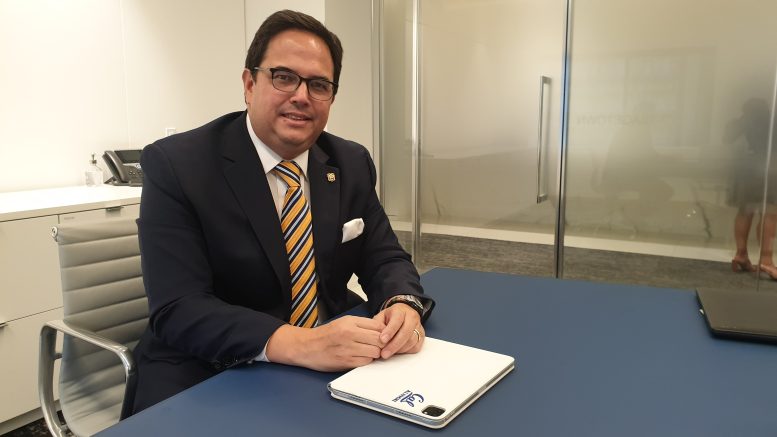Amidst talks of nationalization of mines and stricter regulations for miners in several jurisdictions across South America, Ecuador’s Energy Minister Xavier Vera promises a different path as the government aims to put about half-a-dozen projects into construction by 2025.
In an exclusive interview with The Northern Miner at an event in Toronto during the PDAC conference, the minister said that the nation, which hosts about 18 million people, aims to export about $9-10 billion worth of minerals by 2030.
“I don’t think it’s a good thought,” said Vera when asked his opinion on nationalizing critical minerals. “The public sectors in most countries are not efficient, and that is why it’s very dangerous. Well, there are some exceptions, but that’s the general rule — at least in South America.
“We are not on that path,” he added. “We want to be a government that can facilitate private investment. We think that the private sector should be driving the development of our country.”
President Guillermo Lasso’s government has advocated for the growth of mining projects ever since it took power just over one year ago. While the country currently has two producing mines (EcuaCorriente’s US$1.4-billion Mirador copper mine and Lundin Gold’s (TSX: LUG; US-OTC: LUGDF) US$700-million Fruta del Norte operation), it aims to push five more into production in the next three years.
The country is also set to sign a memorandum of understanding with Barrick Gold (TSX: ABX; NYSE: GOLD) to explore more areas, Vera said. “Only 10% of the entire area of the country has been explored. So, there’s a lot of geological potential,” he added.
But Lasso’s reforms have been criticized in various quarters. Indigenous groups in Ecuador blocked roads across the country this week protesting against rising fuel prices and demanding to limit oil and mining expansion.
Vera, however, says that the government will be open to discussions on mining with NGOs, academics and the other communities.
“One of the problems is that while mining companies know how to do the technical part… some of them are very poor on community strategic management,” Vera said. “Due to the lack of local community politics, local community relationship, there can be a lawsuit from the local people and the project can stop. We will ask companies to create minimum regulations to deal with this.”
Aside from opposition from NGOs and academics, the progress of mining is also resisted by groups that traffic drugs, said Vera, since they support illegal mining in order to use gold bars to evade financial monitoring.
If everything goes to plan and Ecuador manages to create a proper framework for the sector, the country will reopen its mining registry, which it was forced to close in 2018 after a study from the World Bank alleged a lack of transparency in the system.
“We are working together with the ministry of environment, in order to create a public policy in terms of supporting sustainable mining,” Vera said. “We need to create the environment, we need to create the laws, we need to create the regulations… and we are working on that path.”
The minister believes Ecuador can play a key role in the global goal of transitioning away from fossil fuels by supplying copper. When asked why Ecuador, which until a few years ago was a less popular mining destination compared to neighbours Peru and Chile, took so long to promote its sector, Vera replied: “It all depends on the wheel of the government.”
And he reckons that the wheel has finally begun to turn as the country, which depends on hydro electricity for more than 80% of its energy use, marked itself open for mining at PDAC this week.
“We think that the mining sector will be the pillar of our economy,” he concluded.



Be the first to comment on "PDAC 2022: Ecuador hopes to churn its mining ‘wheel’ despite opposition "